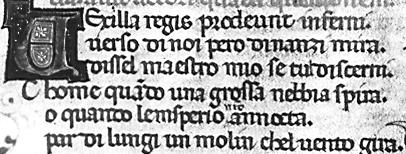Script Type : minuscule
Date : 12th to 15th centuries. This example is from the 14th century.
Location : Italy, southern France and Spain. This example is from Italy.
Function : Book hand


























Distinctive letters : The form of Gothic script known as rotunda has similar letter forms to Gothic textura, but they are not as angular or as laterally compressed. It therefore more closely resembles its predecessor, Caroline minuscule. Letters such a u, m, n and i do not become incomprehensible rows of minims and are easily distinguished.
There
are examples of conjoined letters such as ![]() od or
od or ![]() pe, but the forms of the individual letter
components are broader and more rounded than in the French of English version
of the formal Gothic book script.
pe, but the forms of the individual letter
components are broader and more rounded than in the French of English version
of the formal Gothic book script.
There are two forms of d, an upright form and one with a heavily backsloping ascender. Both the regular and the simplified form of r appear, as well as both tall and short s. The letters u and v are identical, as in Latin.
There are no examples here of j, k or w.
Abbreviations are few. Pass the cursor slowly along the first few lines for a quick running transcript. For a more detailed examination, including of the amazing illustration to the text, proceed to the paleography exercises.
Paleography
exercises using Flash ![]()
Requires at least the Flash 5 plugin
If you are looking at this page without frames, there is more information about medieval writing to be found by going to the home page (framed) or the site map (no frames).